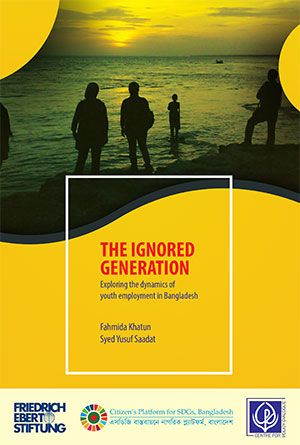 The world today has more young people than ever before. As economic development is picking up pace in most regions, infant mortality rates are falling faster than fertility rates. Consequently, many countries are witnessing a rise in their youth population. With unprecedented number of young people entering the labour market, gainful employing of the youth has become one of the foremost development challenges of our time. According to the International Labour Organization (ILO), about 71 million young people globally were unemployed in 2017, while about 22 per cent of all youth were not in employment, education or training. Such high levels of underutilisation of labour not only represent missed opportunities for the economy, but also potential risks for society.
The world today has more young people than ever before. As economic development is picking up pace in most regions, infant mortality rates are falling faster than fertility rates. Consequently, many countries are witnessing a rise in their youth population. With unprecedented number of young people entering the labour market, gainful employing of the youth has become one of the foremost development challenges of our time. According to the International Labour Organization (ILO), about 71 million young people globally were unemployed in 2017, while about 22 per cent of all youth were not in employment, education or training. Such high levels of underutilisation of labour not only represent missed opportunities for the economy, but also potential risks for society.
The 2030 Agenda for Sustainable Development recognises the urgent need to create decent work for the youth in order to alleviate poverty and accelerate economic growth. A number of targets under various Sustainable Development Goals (SDGs) directly address issues that are pertinent to youth employment as well as their literacy and skills development. It is evident that the indomitable spirit of youth must be harnessed in the quest of accomplishing the ambitious goal of transforming our world.
With a large youth population, Bangladesh faces the challenges of harvesting the benefits of a demographic dividend. However, in recent years, the labour market of Bangladesh has been struggling to absorb the increasing number of young job-seekers. This disconcerting trend remains a fault line in Bangladesh’s prospect of graduating from the least developed country (LDC) category with a momentum. In this context, this study, undertaken by the Centre for Policy Dialogue (CPD), provides an insightful exposure of the causes of youth unemployment in the country. It constitutes an analysis of the latest available empirical evidence. Sincere thanks are due to the authors who have invested their scholarship, time and efforts in preparing this report.
Citizen’s Platform for SDGs, Bangladesh is pleased to be associated with production of this important study, and is happy to make it available to a wider audience. The report published during the ‘Youth Conference 2018 – Bangladesh and Agenda 2030: Aspirations of the Youth’ will indeed provide much substance for discussion forums during and after the Conference. It is also hoped that the evidence-based analyses put forward in this study on Bangladesh youth will greatly benefit the policymakers and the development activists to fine-tune their strategic and programmatic approach in relevant areas.
Authors: Fahmida Khatun and Syed Yusuf Saadat
Publication Period: October 2018

